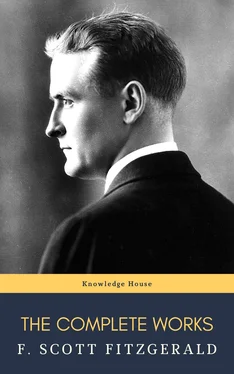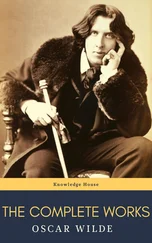Knowledge house - The Complete Works of F. Scott Fitzgerald
Здесь есть возможность читать онлайн «Knowledge house - The Complete Works of F. Scott Fitzgerald» — ознакомительный отрывок электронной книги совершенно бесплатно, а после прочтения отрывка купить полную версию. В некоторых случаях можно слушать аудио, скачать через торрент в формате fb2 и присутствует краткое содержание. Жанр: unrecognised, на английском языке. Описание произведения, (предисловие) а так же отзывы посетителей доступны на портале библиотеки ЛибКат.
- Название:The Complete Works of F. Scott Fitzgerald
- Автор:
- Жанр:
- Год:неизвестен
- ISBN:нет данных
- Рейтинг книги:3 / 5. Голосов: 1
-
Избранное:Добавить в избранное
- Отзывы:
-
Ваша оценка:
- 60
- 1
- 2
- 3
- 4
- 5
The Complete Works of F. Scott Fitzgerald: краткое содержание, описание и аннотация
Предлагаем к чтению аннотацию, описание, краткое содержание или предисловие (зависит от того, что написал сам автор книги «The Complete Works of F. Scott Fitzgerald»). Если вы не нашли необходимую информацию о книге — напишите в комментариях, мы постараемся отыскать её.
The first table of contents (at the very beginning of the ebook) lists the titles of all novels included in this volume. By clicking on one of those titles you will be redirected to the beginning of that work, where you'll find a new TOC that lists all the chapters and sub-chapters of that specific work.
The Complete Works of F. Scott Fitzgerald — читать онлайн ознакомительный отрывок
Ниже представлен текст книги, разбитый по страницам. Система сохранения места последней прочитанной страницы, позволяет с удобством читать онлайн бесплатно книгу «The Complete Works of F. Scott Fitzgerald», без необходимости каждый раз заново искать на чём Вы остановились. Поставьте закладку, и сможете в любой момент перейти на страницу, на которой закончили чтение.
Интервал:
Закладка:
Of the things they possessed in common, greatest of all was their almost uncanny pull at each other’s hearts. The day they left the hotel in Coronado she sat down on one of the beds while they were packing, and began to weep bitterly.
“Dearest—” His arms were around her; he pulled her head down upon his shoulder. “What is it, my own Gloria? Tell me.”
“We’re going away,” she sobbed. “Oh, Anthony, it’s sort of the first place we’ve lived together. Our two little beds here—side by side—they’ll be always waiting for us, and we’re never coming back to ’em any more.”
She was tearing at his heart as she always could. Sentiment came over him, rushed into his eyes.
“Gloria, why, we’re going on to another room. And two other little beds. We’re going to be together all our lives.”
Words flooded from her in a low husky voice.
“But it won’t be—like our two beds—ever again. Everywhere we go and move on and change, something’s lost—something’s left behind. You can’t ever quite repeat anything, and I’ve been so yours, here—”
He held her passionately near, discerning far beyond any criticism of her sentiment, a wise grasping of the minute, if only an indulgence of her desire to cry—Gloria the idler, caresser of her own dreams, extracting poignancy from the memorable things of life and youth.
Later in the afternoon when he returned from the station with the tickets he found her asleep on one of the beds, her arm curled about a black object which he could not at first identify. Coming closer he found it was one of his shoes, not a particularly new one, nor clean one, but her face, tear-stained, was pressed against it, and he understood her ancient and most honorable message. There was almost ecstasy in waking her and seeing her smile at him, shy but well aware of her own nicety of imagination.
With no appraisal of the worth or dross of these two things, it seemed to Anthony that they lay somewhere near the heart of love.
The Gray House.
It is in the twenties that the actual momentum of life begins to slacken, and it is a simple soul indeed to whom as many things are significant and meaningful at thirty as at ten years before. At thirty an organ-grinder is a more or less moth-eaten man who grinds an organ—and once he was an organ-grinder! The unmistakable stigma of humanity touches all those impersonal and beautiful things that only youth ever grasps in their impersonal glory. A brilliant ball, gay with light romantic laughter, wears through its own silks and satins to show the bare framework of a man-made thing—oh, that eternal hand!—a play, most tragic and most divine, becomes merely a succession of speeches, sweated over by the eternal plagiarist in the clammy hours and acted by men subject to cramps, cowardice, and manly sentiment.
And this time with Gloria and Anthony, this first year of marriage, and the gray house caught them in that stage when the organ-grinder was slowly undergoing his inevitable metamorphosis. She was twenty-three; he was twenty-six.
The gray house was, at first, of sheerly pastoral intent. They lived impatiently in Anthony’s apartment for the first fortnight after the return from California, in a stifled atmosphere of open trunks, too many callers, and the eternal laundry-bags. They discussed with their friends the stupendous problem of their future. Dick and Maury would sit with them agreeing solemnly, almost thoughtfully, as Anthony ran through his list of what they “ought” to do, and where they “ought” to live.
“I’d like to take Gloria abroad,” he complained, “except for this damn war—and next to that I’d sort of like to have a place in the country, somewhere near New York, of course, where I could write—or whatever I decide to do.”
Gloria laughed.
“Isn’t he cute?” she required of Maury. “‘Whatever he decides to do!’ But what am I going to do if he works? Maury, will you take me around if Anthony works?”
“Anyway, I’m not going to work yet,” said Anthony quickly.
It was vaguely understood between them that on some misty day he would enter a sort of glorified diplomatic service and be envied by princes and prime ministers for his beautiful wife.
“Well,” said Gloria helplessly, “I’m sure I don’t know. We talk and talk and never get anywhere, and we ask all our friends and they just answer the way we want ’em to. I wish somebody’d take care of us.”
“Why don’t you go out to—out to Greenwich or something?” suggested Richard Caramel.
“I’d like that,” said Gloria, brightening. “Do you think we could get a house there?”
Dick shrugged his shoulders and Maury laughed.
“You two amuse me,” he said. “Of all the unpractical people! As soon as a place is mentioned you expect us to pull great piles of photographs out of our pockets showing the different styles of architecture available in bungalows.”
“That’s just what I don’t want,” wailed Gloria, “a hot stuffy bungalow, with a lot of babies next door and their father cutting the grass in his shirt sleeves—”
“For Heaven’s sake, Gloria,” interrupted Maury, “nobody wants to lock you up in a bungalow. Who in God’s name brought bungalows into the conversation? But you’ll never get a place anywhere unless you go out and hunt for it.”
“Go where? You say ‘go out and hunt for it,’ but where?”
With dignity Maury waved his hand paw-like about the room.
“Out anywhere. Out in the country. There’re lots of places.”
“Thanks.”
“Look here!” Richard Caramel brought his yellow eye rakishly into play. “The trouble with you two is that you’re all disorganized. Do you know anything about New York State? Shut up, Anthony, I’m talking to Gloria.”
“Well,” she admitted finally, “I’ve been to two or three house parties in Portchester and around in Connecticut—but, of course, that isn’t in New York State, is it? And neither is Morristown,” she finished with drowsy irrelevance.
There was a shout of laughter.
“Oh, Lord!” cried Dick, “neither is Morristown!’ No, and neither is Santa Barbara, Gloria. Now listen. To begin with, unless you have a fortune there’s no use considering any place like Newport or Southhampton or Tuxedo. They’re out of the question.”
They all agreed to this solemnly.
“And personally I hate New Jersey. Then, of course, there’s upper New York, above Tuxedo.”
“Too cold,” said Gloria briefly. “I was there once in an automobile.”
“Well, it seems to me there’re a lot of towns like Rye between New York and Greenwich where you could buy a little gray house of some—”
Gloria leaped at the phrase triumphantly. For the first time since their return East she knew what she wanted.
“Oh, yes !” she cried. “Oh, yes ! that’s it: a little gray house with sort of white around and a whole lot of swamp maples just as brown and gold as an October picture in a gallery. Where can we find one?”
“Unfortunately, I’ve mislaid my list of little gray houses with swamp maples around them—but I’ll try to find it. Meanwhile you take a piece of paper and write down the names of seven possible towns. And every day this week you take a trip to one of those towns.”
“Oh, gosh!” protested Gloria, collapsing mentally, “why won’t you do it for us? I hate trains.”
“Well, hire a car, and—”
Gloria yawned.
“I’m tired of discussing it. Seems to me all we do is talk about where to live.”
“My exquisite wife wearies of thought,” remarked Anthony ironically. “She must have a tomato sandwich to stimulate her jaded nerves. Let’s go out to tea.”
Читать дальшеИнтервал:
Закладка:
Похожие книги на «The Complete Works of F. Scott Fitzgerald»
Представляем Вашему вниманию похожие книги на «The Complete Works of F. Scott Fitzgerald» списком для выбора. Мы отобрали схожую по названию и смыслу литературу в надежде предоставить читателям больше вариантов отыскать новые, интересные, ещё непрочитанные произведения.
Обсуждение, отзывы о книге «The Complete Works of F. Scott Fitzgerald» и просто собственные мнения читателей. Оставьте ваши комментарии, напишите, что Вы думаете о произведении, его смысле или главных героях. Укажите что конкретно понравилось, а что нет, и почему Вы так считаете.












